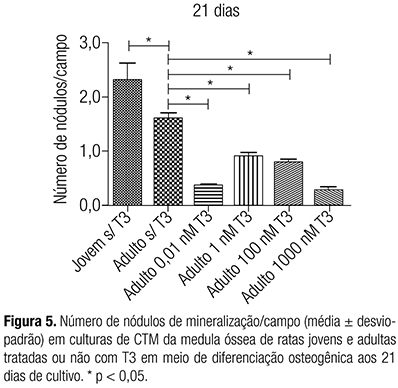OBJECTIVE: To examine if triiodothyronine (T3) increases osteogenic differentiation in bone marrow mesenchymal stem cells (BMMSCs) of adult rats compared with young rats. MATERIALS AND METHODS: BMMSCs were cultured in osteogenic medium and distributed into six groups: 1) BMMSCs of young rats; 2) BMMSCs of adult rats; 3, 4, 5 and 6) BMMSCs of adult rats with T3 (0.01, 1, 100 to 1000 nM). We analyzed alkaline phosphatase activity, dimethylthiazol (MTT) conversion, and collagen synthesis at 7, 14, and 21 days, and percentage of cells per field and number of mineralized nodules at 21 days of differentiation. RESULTS: T3 reduced MTT conversion, alkaline phosphatase activity, collagen synthesis, and the synthesis of mineralizalized nodules in at least one of the doses and periods studied (p < 0.05). Values were lower when compared with young and adult rats BMMSCs (p < 0.05) without T3. CONCLUSION: T3 has a negative effect on the factors involved in osteogenic differentiation of BMMSC from adult rats.
Mesenchymal stem cells; bone marrow; osteogenic differentiation; triiodothyronine; female rats






